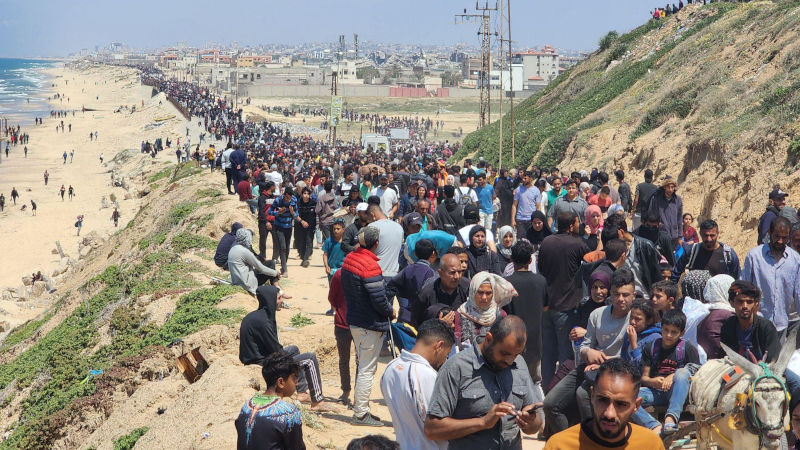Genocide in Gaza: History repeats itself
July 4, 2025
For the past 21 months, I have endured the painful experience of displacement, moving between tents under relentless bombardment in Gaza.
Time and again, I’ve asked myself: how long does it take for the world to recognise crimes against humanity? In Gaza, the Israeli military campaign’s genocidal intent and the sheer scale of the catastrophe seem self-evident.
And yet, history reveals a shameful global record when it comes to acknowledging such atrocities, often delaying recognition and action until long after they unfold. This article examines the ongoing genocide in Gaza, drawing parallels with historical precedents that exposed the world’s inertia and calls for immediate intervention to halt this humanitarian disaster and secure justice.
History exposes global inaction: lessons from the past
The world has consistently failed to act swiftly against genocides, a pattern that has repeated itself throughout modern history. In Namibia, between 1904 and 1908, German colonial forces carried out genocide against the Herero and Nama peoples, killing 65,000 Herero and 10,000 Nama.
The massacre was in response to an uprising against colonial land seizures. Survivors documented their suffering in a British report known as the “Blue Book” in 1918, describing the period as “a long nightmare of suffering, bloodshed, tears, humiliation, and death”. But in 1926, all copies of the report were destroyed in an effort to erase the African perspective. Germany did not formally recognise the genocide or issue an apology until 2021.
In Tanzania, a similar pattern unfolded during the Maji Maji Rebellion in 1905. Germany forced the local population to grow cotton and, when they resisted, the colonial forces responded with a scorched-earth policy, killing an estimated 300,000 people. Rebels were publicly hanged, and their remains were shipped to Germany for pseudo-scientific experiments aimed at proving European racial superiority. A formal apology wasn’t issued until 2023, when the German president visited the Maji Maji memorial.
The Holocaust, one of the most recognised genocides in history, was no exception to the pattern of global inaction. From 1933 onward, Jews in Germany faced escalating persecution, yet countries like the UK and the US imposed strict immigration limits. In Britain, policy was influenced by rising antisemitism, while the US refused to issue visas to Jewish refugees, citing an “anti-foreigner climate” in Congress and widespread public opposition.
Apartheid in South Africa, now widely condemned, was once quietly supported by Western powers. Between 1960 and 1994, successive British Governments prioritised economic interests over sanctions. In the US, President Ronald Reagan adopted a policy of “constructive engagement”, rejecting sanctions and aiming to weaken the African National Congress, which his administration viewed as aligned with communism. Archbishop Desmond Tutu called Reagan’s stance “immoral and evil”.
In Rwanda in 1994, over 800,000 Tutsi and moderate Hutus were slaughtered in just 100 days, with sexual violence systematically used as a weapon of war. Despite warnings from human rights organisations and UN staff that genocide was imminent, the world stood by. UN peacekeeping forces withdrew, and US officials even avoided using the term “genocide.” President Bill Clinton did not formally apologise until 1998, admitting that the world “did not act quickly enough”.
Genocide in Gaza: a catastrophe documented in real time
What is happening in Gaza today mirrors these historic failures but with a crucial difference: it is being documented in real time. The killing of civilians, the bombing of hospitals and schools, the destruction of universities, the assassination of journalists and poets all have been meticulously recorded and archived. Israeli officials have made public statements signalling intentions of ethnic cleansing, while videos show Israeli soldiers looting Palestinian homes and bragging about their destruction.
The blockade on Gaza, imposed since 2007, has worsened the humanitarian crisis. The United Nations has described it as “collective punishment” in violation of international law. The blockade has restricted access to food, water, electricity and medical supplies, leading to widespread malnutrition and the collapse of the health system. Over 1.9 million Palestinians have been displaced multiple times, while their homes, schools, and cultural landmarks have been destroyed, tearing at the social fabric of Palestinian society.
Human rights organisations have meticulously documented these crimes, and some governments have begun to act, issuing diplomatic condemnations and even imposing sanctions. Still, the global response remains slow. The United Nations has stated that Israel’s military operations in Gaza constitute war crimes and crimes against humanity, including the deliberate targeting of civilian infrastructure and the use of starvation as a weapon of war.
A call for justice and immediate action
The world’s failure to confront the genocide in Gaza is not just a moral collapse, it is a violation of international law. The 1948 Genocide Convention obligates nations to prevent and punish such crimes. Yet, history shows that recognition and action are often delayed. In Gaza, the evidence is overwhelming, and the urgency undeniable.
There’s a saying in Hindi and Urdu: “Der aaye, durust aaye.” It is often translated as “Better late than never,” but its more accurate Persian-origin meaning is: “What comes late must be righteous and just.” Justice for Palestine may come late, but when it does, it must be complete and fair. The world cannot afford to repeat the mistakes of the past. Action must be taken now to stop the genocide in Gaza and hold those responsible accountable.
In conclusion, the ongoing genocide in Gaza is a stark reminder of the world’s repeated failure to prevent atrocities as they unfold. From Namibia to Tanzania, from the Holocaust to apartheid and Rwanda, history shows a pattern of delayed recognition and intervention. Yet, Gaza stands apart in its live documentation and abundance of evidence. The international community must act urgently to end the suffering and deliver justice, however delayed, so that it may finally be just and complete.
The views expressed in this article may or may not reflect those of Pearls and Irritations.

